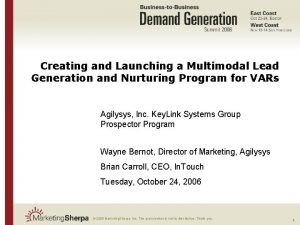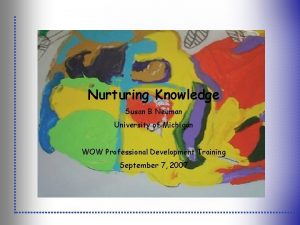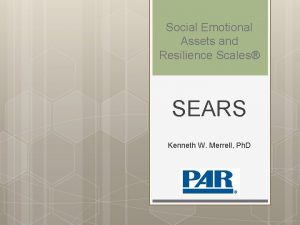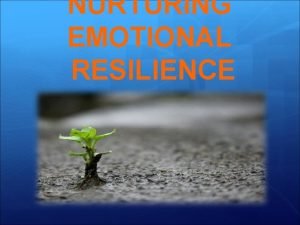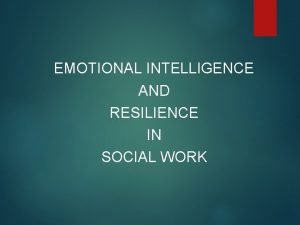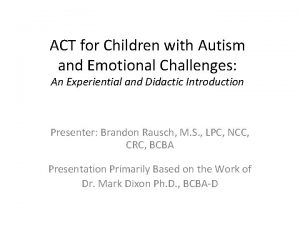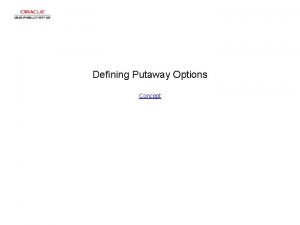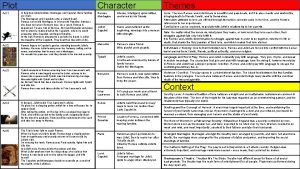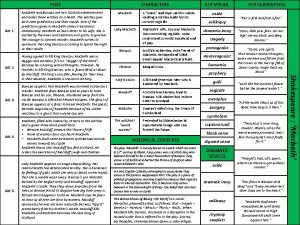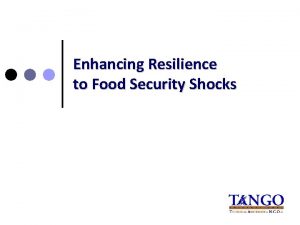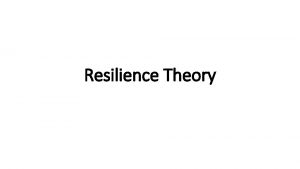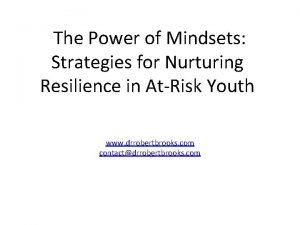NURTURING EMOTIONAL RESILIENCE Defining Emotional Resilience RESILIENCE act






















- Slides: 22

NURTURING EMOTIONAL RESILIENCE

Defining Emotional Resilience RESILIENCE - act of ‘springing back’ (COD, 1990) Rutter (1985) identifies 3 fundamental components Ø A sense of self-esteem & self-confidence Ø A belief in one’s own self-efficacy & ability to deal with change and adaptation Ø A repertoire of social problem-solving approaches Cooper (2000; 31) defines resilience as: ‘the ability to take hard knocks, to weather the storm and to continue to value oneself whatever happens. ’

Situations that may Require Emotional Resilience § Rejection § Failure § Hostility § Testing relationships § Very difficult/boring task § Injustice*

Reflections of Life

BLOCKERS & BOOSTERS (Personality & Mindsets) BOOSTERS BLOCKERS Confidence Low self esteem Perseverance Predisposition to worry & anxiety Good organization Good social skills Emotionally calm & stable Work avoidance Poor organization Anger & rebelliousness

Self-Esteem (Made Simple) Self-Concept Self-identity : actual ability, aptitude Self-worth : aspiration, expectation Self-esteem : feel about yourself

Self Esteem (Made Simple) Self-identity Self-Esteem = -------Self-worth

Self Esteem (Made Simple) Ability/Aptitude Feelings about = ------------Yourself Aspiration/expectations

From Negative Habits to Positive Habits § Self-criticism vs. Accepting self § Needing to be perfect vs. Taking risk § Intolerance vs. Tolerance § I can’t be bothered vs. Developing passions in life § I can’t vs. I can § Needing approval vs. Being independent

How do you know if you are experiencing an unhealthy level of stress? I. Physiological Symptoms: a) b) c) d) e) f) g) h) I) increased heart rate increased sweating cold hands and feet feelings of nausea “butterflies in stomach” rapid breathing tense muscles dry mouth needing to go to the toilet more often diarrhea

II. Physical Symptoms a) change in appetite b) aches and pains c) feeling of constant tiredness and fatigue d) worsening of: i) asthma ii) digestive disorders iii) headaches

III. Behavioural Symptoms a) b) c) d) e) f) g) h) i) j) k) talking too quickly or too loudly yawning fiddling and twitching nail biting, grinding of teeth easily irritated defensiveness being critical difficulty concentrating more forgetful increased absenteeism neglect of personal grooming

IV. Emotional Symptoms a) anxiety b) frustration c) short temper d) negative thinking e) low self esteem f) feeling out of control and a sense of being overwhelmed g) depression h) helplessness I) restlessness m) insomnia

STRATEGIES FOR STRESS MANAGEMENT Symptom Reduction Strategies: 1) Problem Solving Strategies 2) Adaptation Strategies 3) Prevention Strategies

WHAT CAN WE DO? a) learn to re-evaluate priorities b) good time management c) recreation d) diet e) rest/leisure f) exercise g) work smart, stay focused h) engage in stress management & relaxation i) see things from the eternal perspective

Romans 8: 31 -39 31 What, then, shall (Your Name) say in response to this? If God is for (Your Name), who can be against (Your Name)? 32 He who did not spare his own Son, but gave him up for (Your Name) —how will he not also, along with him, graciously give (Your Name) all things? 33 Who will bring any charge against those whom God has chosen? It is God who justifies. 34 Who is he that condemns? Christ Jesus, who died—more than that, who was raised to life—is at the right hand of God and is also interceding for (Your Name).

35 Who shall separate (Your Name) from the love of Christ? Shall trouble or hardship or persecution or famine or nakedness or danger or sword? 36 As it is written: "For (Your Name) ’s sake we face death all day long; we are considered as sheep to be slaughtered. ” 37 No, in all these things we are more than conquerors through him who loved (Your Name). 38 For I am convinced that neither death nor life, neither angels nor demons, neither the present nor the future, nor any powers, 39 neither height nor depth, nor anything else in all creation, will be able to separate (Your Name) from the love of God that is in Christ Jesus our Lord.

The quest for excellence in service to God can be without God. “There is much knowledge in the world but little wisdom. Wisdom comes from our centeredness in the finality of the absoluteness of God’s truth and the total and complete surrender to His loving will. ” (Journal: 12 October 2006)

Understanding who we are in relation to who God is and who God intends us to be in relation to where we believe we want to go… (Journal: 14 Sep 2007) The Presenting Tension

CHRISTIA N SUCCESS Christian Success is measured by our commitment and surrender to the Lordship of Christ. (Journal: 15 Jan 2008)

“Christian living is about a tension. A tension of daily dying and surrendering to God’s awesome gentleness and perfect love. This gives us the strength, hope and joy to live each day for Him. Though difficult, it promises grace. Though painful, it promises hope. Though perplexing, it promises peace. Above all, we are never alone!. . . …In total surrender comes complete peace” (Journal: 17 June 2002)

God loves each of us as if there were only one of us. Saint Augustine
 Relative clauses defining and non defining
Relative clauses defining and non defining Defining or non defining relative clauses
Defining or non defining relative clauses Relative clauses defining and non defining
Relative clauses defining and non defining Defining relative clause meaning in telugu
Defining relative clause meaning in telugu Relative pronouns defining and non-defining
Relative pronouns defining and non-defining Relative clauses
Relative clauses Hot prospector reseller
Hot prospector reseller Nurturing knowledge
Nurturing knowledge Nurturing schools programme
Nurturing schools programme Dr asha menon
Dr asha menon Nurturing school
Nurturing school Lead nurturing for charter schools
Lead nurturing for charter schools Supplementary nurturing
Supplementary nurturing Attachment and emotional resilience theory
Attachment and emotional resilience theory Sears rating scale
Sears rating scale Definition of emotional resilience
Definition of emotional resilience What is emotional resilience in social work
What is emotional resilience in social work Emotional resilience in nursing
Emotional resilience in nursing Lbld meaning
Lbld meaning Macbeth summary
Macbeth summary Act for children with autism and emotional challenges
Act for children with autism and emotional challenges Defining globalization
Defining globalization Non-defining relative clauses as sentence modifiers
Non-defining relative clauses as sentence modifiers






